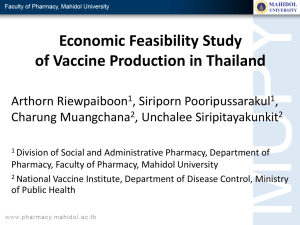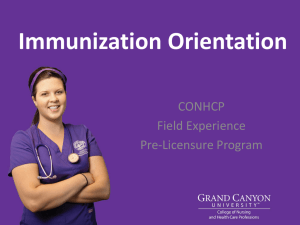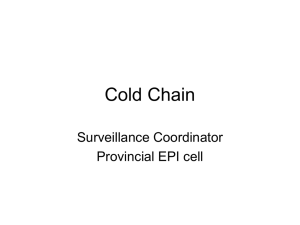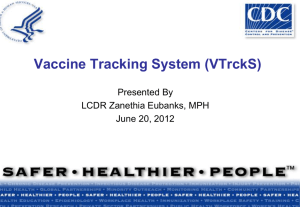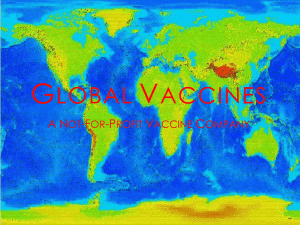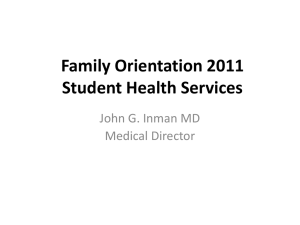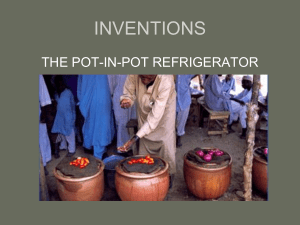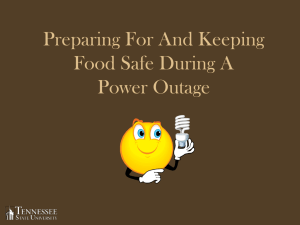Vaccine Storage & Handling
advertisement
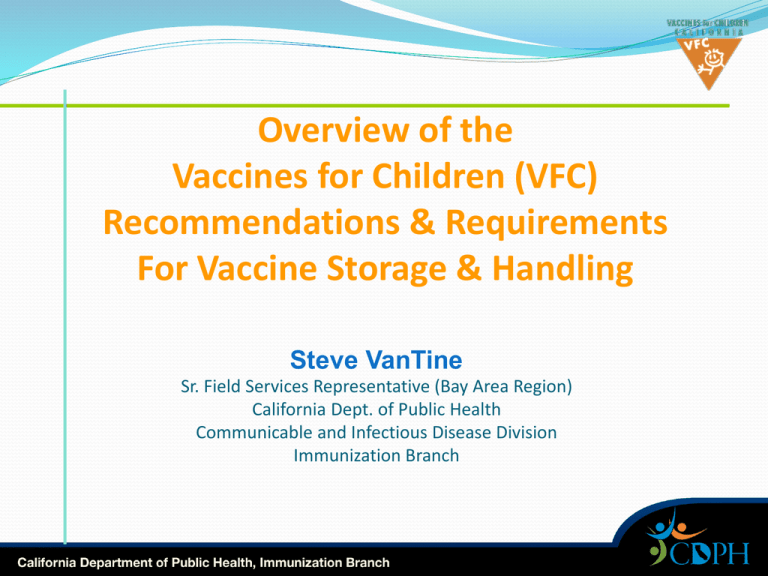
Overview of the Vaccines for Children (VFC) Recommendations & Requirements For Vaccine Storage & Handling Steve VanTine Sr. Field Services Representative (Bay Area Region) California Dept. of Public Health Communicable and Infectious Disease Division Immunization Branch Same price as the 2012 Lexus CT 200h 803 vaccine doses 15cu ft. refrigerator $32,000. worth of vaccine Required Vaccine Storage Temperatures Refrigerator 35°- 46° F (2°-8° C) Freezer Varicella, MMR, MMRV, Zostavax + 5° F (-15° C) or colder 32°F. is freezing Effect of temperature on vaccines Inactivated vaccines and toxoids Too cold (freezing 32°F. or below) Adjuvanted – Adjuvants enhance immune response to an antigen. Antigen and adjuvant bond is immediately and irreversibly broken; adjuvant effect is lost. Hep A Hep B diphtheria-tetanus-pertussis (DTaP, Tdap) Haemophilus influenzae type b (Hib) human papillomavirus (HPV) Pneumococcal Non-adjuvanted- denaturing protein, structural damage Effect of temperature on vaccines Inactivated vaccines and toxoids Too warm (above 35°- 46ºF.) Damage is gradual Very stable compounds. All inactivated vaccines can tolerate room temperature (~77ºF.) for ~ 72 hours Effect of temperature on vaccines Live vaccines Freezing 5°F. or below Lyophilized is freeze dried - undiluted, any lyophilized vaccines cannot be damaged by freezing (including inactivated Caution: DO NOT FREEZE DILUENT Effect of temperature on vaccines Live vaccines Too warm ( above 5ºF.) Damage is rapid or “quick” Varicella – does not tolerate any heat MMR also heat sensitive (store between - 58F to 46F). Although stable in either the refrigerator or freezer, we recommended to store in freezer. Best practices for vaccine storage Store only vaccine in vaccine storage units. Separate the VFC vaccine supply from privately purchased vaccine. Keep vaccines in their original boxes until you are ready to use them. Some vaccines are sensitive to UV light (i.e. HPV, MMR, MMRV, rotavirus, varicella, and zoster vaccines) Group vaccines by pediatric, adolescent, and adult types. Place vaccine in breathable plastic mesh baskets and clearly label baskets by type of vaccine. Keep baskets 2-3 inches from walls and other baskets. Keep vaccines with shorter expiration dates to front of shelf. Transfer short-dated vaccine If you have vaccine that will expire in 4 months or less, contact other VFC Providers to see if they can use the vaccine prior to the expiration date. Keep refrigerator temperatures between 35ºF to 46ºF. Aim for 40º F Keep freezer temperatures at 5ºF or below. What NOT to do… No vaccine in doors, along walls No vaccine in solid plastic trays or containers. No food or lab specimens in refrigerator. No vaccine in drawers or on floor of refrigerator. Never plug into outlet controlled by wall switch. Do not ignore out of range temperatures What’s wrong with this picture? What’s wrong with this picture? Dormitory-style unit Ice in freezer unit Too much vaccine for size Soda in the door Lab specimen in the fridge Vaccine on top shelf probably frozen Clinic refrigerator repeatedly dropped below freezing over a 17-month period in 2005 and 2006 Both of these providers documented similar out of range temperatures for at least 6 months Use Separate Temp Logs Thermometer Recommendations CDC – Certified/Calibrated by NIST, ASTM, or other appropriate agency. “Certified in accordance with NIST or ASTM standards”: A certificate of calibration shows that your thermometer has undergone additional testing to ensure accuracy. Personal preference: Measure temperature of liquid/ or measure ambient air temperature. Types of Thermometers Thermometers that measure air. 1. Probe hanging in air. Thermometers that measure liquid 2. Probe is immersed in a glycol solution. 3. Infrared thermometers and computerized thermometers. 4. Continuous recording: Gives the ability to review and store all past temperatures (on a paper wheel or electronically) for future reference. Graphs temperature over time. Do not confuse a high/low recording thermometer with a continuous-tracking thermometer. High/low units only offer basic information about the warmest and coldest temperature a thermometer has reached. DO NOT RELY ON PAPER WHEEL OR ELECTRONIC RECORDS TO DOCUMENT VACCINE TEMPERATURES. It is a VFC Requirement to use the VFC Approved Temperature Logs to physically monitor and record temperatures twice a day. Thermometer – Digital Certified/Calibrated Thermometer (Only C˚) Certified/Calibrated Continuous Recording NOT CERTIFIED/CALIBRATED NOT CERTIFIED/CALIBRATED NOT CERTIFIED/CALIBRATED Temperatures can vary within the same unit. -1.6O 37.4°F. 42.3°F. 46.7°F. 33.4°F. 31.8°F Place thermometer or thermometer probe towards center of the unit. Storage and Handling Problem Protocol Notify your facility manger Contact your Field or VFC Rep and discuss the problem. Do NOT contact the manufacturer. Your Field Rep will complete a “Vaccine Storage and Handling Problem Report”. Do NOT use the vaccine until its efficacy has been determined. Temperature is “Out of Range” Freezer is too Warm 1. The freezer Temp is above +5 ˚F Call your Field Rep or VFC Rep. They may refer this problem to Merck, (1-800-827-4829) for resolution. Have specific information available, i.e.. lot number, date received, temperatures, how long temperature “out of range”, etc . Temperature is “Out of Range” Refrigerator Too Cold Too Warm Temperature is 32 – 35 ˚ F: Adjust the refrigerator temperature control to recommended range (recommended temperature: 40 ˚ F) Temperature is 32 ˚F or colder, or 47 ˚ F and warmer: Contact your Field Services Rep or VFC Rep IMMEDIATELY (the Immunization Branch has established protocols for these situations)! Questionable Vaccine Viability Do NOT allow clinic staff to use vaccine until efficacy is determined. Label vaccine as “Do Not Use” Wait for resolution before taking any action. Do not discard vaccines – leave in refrigerator or freezer. Any spoiled or expired vaccine needs to be returned to the VFC Program Contact your VFC Field Rep for further instructions. Recent Changes Use of a biosafe glycol-encased probe or a similar temperature buffered probe rather than measurement of ambient air temperatures, and; Use of digital data loggers with detachable probes that record and store temperature information at frequent programmable intervals for 24 hour temperature monitoring rather than non-continuous temperature monitoring, and; Use of stand-alone refrigerator and stand-alone freezer units suitable for vaccine storage rather than combination (refrigerator+freezer) or other units not designed for storing fragile biologics, such as vaccines, and; Discontinuing use of dorm-style or bar-style refrigerator/freezers for ANY vaccine storage, even temporary storage, and; Weekly review of vaccine expiration dates and rotation of vaccine stock. http://www.cdc.gov/vaccines/recs/storage/interim.htm Steven VanTine Sr. Field Services Representative (510) 412-1601 steven.vantine@cdph.ca.gov Christina Sadorra Sapad, MPA Jr. Field Services Representative (510) 412-1609 christina.sadorra@cdph.ca.gov Augustine Yoo VFC Representative (510) 412-1608 Augustine.Yoo@cdph.ca.gov Brenton Louie VFC Representative (510) 412-1607 Brenton.Louie@cdph.ca.gov Veronica Plaza CAIR Implementation Specialist (510) 412-1602 Veronica.Plaza@cdph.ca.gov Karina Alvarez CAIR Implementation Specialist Karina.Alvarez@cdph.ca.gov
